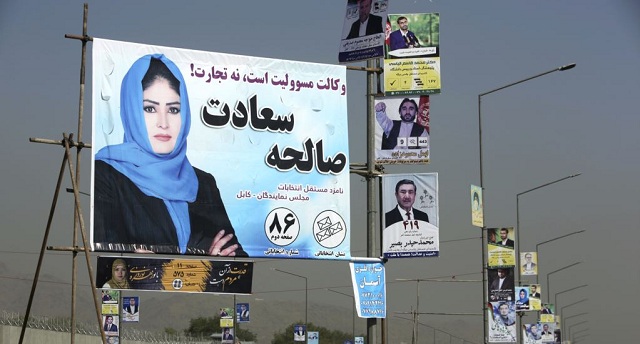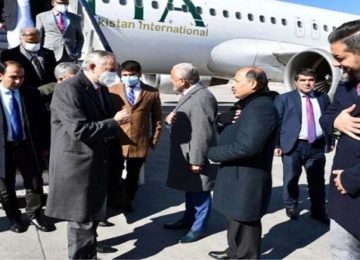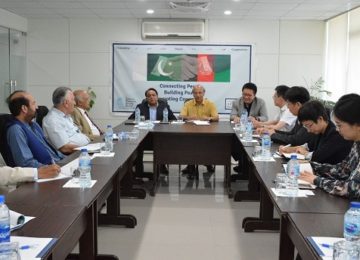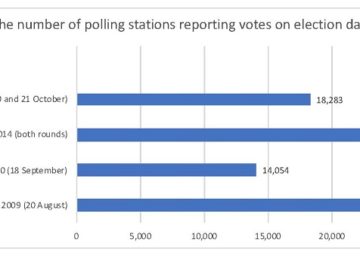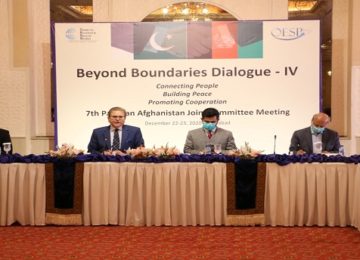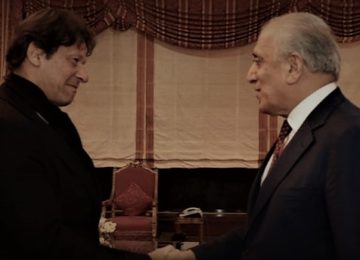Afghanistan’s parliamentary election campaign ended on Wednesday 17 October 2018 with the killing of Helmand candidate Jabbar Qahraman by a mine explosion in his campaign office – the fifth candidate killed during the campaign period. “Taghir” – change – has been a key word in many of the campaigns and a hope expressed by many voters, even though the slogans were rarely backed by detailed political programmes. Among the 2565 candidates running countrywide – 418 of them women according to IEC figures – there are many new faces, alongside a majority of the sitting MPs. Thomas Ruttig and the AAN team look at the spectrum of candidates and ponder what the turnover in the Wolesi Jirga might be (without claiming to be complete or exhaustive). AAN has put together a dossier of dispatches related to the coming elections, looking at preparations and political manoeuvring. Each dispatch in the Election Conundrum series will be added to it.
A desire for change
“Taghir” – change – had already been a key word during the presidential election in 2014. Chief Executive Dr Abdullah represented a coalition called “Taghir wa Omid” (change and hope) and although president Ashraf Ghani did not use the word in his slogans, he did run on a promise of change, while preserving what had been achieved: “tahawol wa tadawom” (“transformation and continuity”). This time, “taghir” features again, as illustrated by many candidate posters and in some of the programmes that candidates distributed, some in print, others on memory sticks.
A surprising number of candidates who declare themselves ‘pro-reform’ are wealthy businessmen. One of them is Fahim Hashemi, running in Kabul. He is the owner of one of the biggest private television channels, One TV, and a big contractor for the international troops and oil import business. On his election materiel, the word “taghir” is the only feature, apart from his name, election symbol and ballot number. Similarly, another big business candidate for Kabul, Khan Muhammad Wardak, owner of one of Afghanistan’s biggest companies, Khan Steel, and also in the contracting business, further developed the slogan to say: Khan Muhammad ta raya, musbat badlun ta raya (“Vote for Khan Muhammad, vote for positive change”). So did Muhammad Latif Fayaz, from Ghazni province but running from Kabul under the slogan: Ba tadbir ba su-ye taghir (“With a plan for change“). He has worked for the United Nations and several national and international NGOs and is now teaching at private universities. Muhammad Sangar Amirzada, also competing in Kabul and a former member of ex-president Hamed Karzai’s chief of staff office, heads the youth activists’ network Shabaka-ye Eslah wa Taghir (“Network for Reform and Change“) affiliated with former minister and presidential hopeful for 2019 Omar Daudzai.
Many of the candidate businessman, and also some of the candidates with civil society background, own or run institutions of higher learning. This caters to the widespread demand for higher education, gives them an air of philanthropy, and helps create a voter base. Jan Muhammad Sherzad, a candidate in Helmand, told AAN that he believes that all 300 students of his English courses will vote for him (although, as usual, candidates have a tendency to overestimate the strength of their ties).
The next generation?
Conversations with many Afghans in the run-up to this election, as well as media reports indicate that there is widespread hope, again, that a new, young generation of candidates will make it into the now 250 seats-strong Wolesi Jirga. The hope underneath is that they will behave more honestly than the current set of parliamentarians who, as the New York Times recently wrote, are “notoriously corrupt” (see also AAN research on corruption in the Afghan parliament here and this AFP news item here). A poll by the Afghanistan Institute for Strategic Studies (AISS) published this month showed that only 9.6 per cent of respondents answered ‘yes’ when asked whether they were “satisfied” with the work of the current set of members of parliament (15.1 per cent said “somehow”) and only 6.5 per cent said they had “benefited” from their work (10.2 per cent said “somehow”).
This hope that a new generation will be voted in is fortified by the many new and young faces on some candidate lists, particularly in Kabul. In the capital alone, 804 candidates are running – the ballot paper has a newspaper format, with 15 pages – which leaves enough space for new, young faces. The officially published candidates’ lists however (see here; the lists themselves are in Dari only) do not give the dates of birth of the contenders, so their ages must be guessed. On many provincial lists, from Kunar via Uruzgan, Parwan and Panjshir to Herat, the faces of elders and mid-agers dominate.
Sons, daughters and relatives of the post-2001 establishment: politicians, former mujahedin leaders, businessmen
Among the younger candidates, the children and relatives of well-known warlords-turned-politicians and members of other prominent families are most easily identifiable. Some Afghan media have already browsed through the lists and categorised the candidates – foremost the Dari-only news website Khabarnama (see here).
One subcategory extensively described are the sons, daughters and other relatives of the first tier of the mujahedin party leaders, such as:
- Bator Dostum running from Jawzjan province: son of General Abdulrashid Dostum, first vice president and leader of the Uzbek-dominated Jombesh party,
- Muhammad Baqer Muhaqeq and Muhammad Ali Muhaqeq, running from Kabul and Balkh respectively: sons of Haji Muhammad Muhaqeq, leader of one of the Hazara-dominated parties, Hezb-e Wahdat and second deputy of the chief executive,
- Muhammad Alem Khalili running from Kabul: son of Muhammad Karim Khalili, the leader of another Hazara-dominated party, Hezb-e Wahdat-e Mardom, a former vice president and now chairman of the High Peace Council (HPC);
- Haji Abdul Reza Khalili running from Kabul with the slogan “Excellence, pragmatism and accountability”: a nephew of HPC chief Khalili, with interests in real estate; he reportedly also owns production companies for mineral water and construction materials,
- Jamaluddin Hekmatyar running from Kabul: son of Gulbuddin Hekmatyar, the recently reconciled leader of Hezb-e Islami Afghanistan (AAN background here),
- Zaher Qadir, a sitting MP already and the son of late eastern mujahedin leader Haji Qadir, in Nangrahar,
- Sayed Taha Sadeq running from Herat: son of western Afghanistan’s grey eminence, former governor Ismail Khan,
- Sayed Mujtaba Anwari and Sayed Mahdi Anwari, both running in Kabul: sons of the late Sayed Hussain Anwari, leader of the Shia mujahedin party Harakat-e Islami, former minister of agriculture and of planning and former governor of Kabul and Herat.
None of the major ‘mujahedin party’ leaders are running themselves: not Sayyaf, Qanuni or Muhaqeq who were members of both the 2005 and 2010 Wolesi Jirgas (1); HamedGailani, who was candidate in 2005, or Ismail Khan and Hekmatyar, who had so far never ran.
Other – not so young – close relatives of powerful politicians include Muhammad Rafiq Sherzai, the brother of 2014 presidential candidate and former Kandahar and Nangrahar governor Gul Agha Sherzai, and Humayun Ramazan, the brother of Ahmad Shah Ramazan, a sitting MP; both are running from Balkh. Also, Sayeda Massuda Yari, daughter-in-law of late Haji Sulaiman Yari, who was a selected senator for the Upper House from Maidan Wardak, and Ruqia Alemi Balkhi, sister of minister for Refugees and Returnees Sayed Hussain Alemi Balkhi. Both are running from Kabul.
Almost as well known, at least among Afghans, are those from the families of the second tier of former mujahedin leaders:
- Zabihullah Almas, running from Kabul: son of sitting MP Haji Muhammad Almas Zahed from Parwan province, who was recently appointed as presidential advisor and is not running again,
- Haji Ajmal Rahmani, running from Kabul: nephew of General Baba Jan, a major commander in the area of Bagram airbase, who became rich as a contractor providing for the base’s supplies and is said to be financially supporting a number of other candidates; Haji Ajmal himself recently injected substantial capital into Afghanistan’s professional football league – now named the “Rahmani Foundation Afghan Premier League” in his honour – and bought one of its teams. (A brother of Baba Jan is also running, again: Mir Rahman Rahmani, currently the head of the Wolesi Jirga’s economic commission),
- Azizullah Amiri, running from Kunduz: son of late commander Amir, one of the famous Ittehad-e Islami leaders in the north, running for the first time,
- Haidar Khan Naimzai, a current MP who is running for the kuchi constituency again: son of Naim Kuchi, a former Taleb who reconciled with the Karzai government after he was released from Guantanamo,
- Mir Wais Salam, running for a kuchi seat, while his father, sitting MP Abdul Salam Raketi, runs in Zabul,
- Shah Aghasi Ibrahimkhel, running from Balkh: son of famous Jihad-time commander Akhtar Muhammad Ibrahimkhel (better known as Akhtar Luchak),
- Bashir Ahmad Ziayi, running from Takhar: son of Mullah Piram Qul Ziayi, one of the most important Jamiati commanders in the northeast and a 2005 MP, who branched out into the militia ‘business’ (AAN background here),
- Ahmad Tamim Jurat, running from Kabul: son of General Din Muhammad Jurat, a commander under late commander Ahmad Shah Massud, former deputy National Security Advisor and presidential advisor on security and defense who was sacked on 1 October 2018
- with Zia-ur-Rahman Kashmir Khan, in Kunar, the son of insurgent Hezb-e Islami commander Kashmir Khan, who reportedly died in a Pakistani capital in 2016, runs.
Many candidates use photos of their prominent family members to make the relationship plain. In some cases even non-relatives do this. Kabul candidate Sayed Baqer Mohseni Kazemi, for example, has put a picture of assassinated Shia party leader Mustafa Kazemi in the background of his posters – even though they are no relation of each other (he belongs to the same party, though).
There are also wealthy businessmen, or their young relatives, running who do not have a commander’s past. They include owner of Afghan United Bank, Ahmad Jawed Jaihun, who has a paid-for banner on the top of the ToloNews website; Ajmal Nawab, son of former governor of Paktika, Helmand and Nangrahar Gulab Mangal who have also branched out into the construction business; and Rais Muhammad Ibrahimzada in Balkh province, son of Ghulam Abbas Ibrahimzada, who is one of the richest men in the north and currently the deputy head of the Wolesi Jirga’s economy commission.
But the overlap between the categories of those who had a leadership background in the fight against the Soviets and those who have joined in the post-2001 wealth is obvious. Khabarnama has published two lists with 16 of the country’s richest businessmen – no businesswoman among them – running in the 20 October election. Part 1 can be found here and part 2 here (AAN’s English translation in the annex).
Relatives of (former) government officials
With Mariam Soleimankhail, Jamil Karzai (both in Kabul) and Rohullah Khanzada(in Kandahar), young, distant relatives of both post-2001 presidents are running. Soleimankhail is a niece of president Ghani who worked as head of the international affairs department in the presidential office and later in the government’s rural education programme. Jamil Karzai, a distant nephew of Hamed Karzai, was already an MP in the 2005 parliament. He is a minor businessman and runs his own National Moderation Party (Hezb-e Etedal-e Melli). Khanzada, a businessman and contractor, is anothercousin of Karzai.
In Herat, Basir Ahmad Arwin Taheri, a nephew of Rangin Dadfar Spanta, foreign minister and national security advisor under Karzai, is among the candidates. Acousin and a brother of Sayyed Abdul Wahid Qatali, President Ghani’s chief of staff – Sayyed Azim KabarzanI and Sayyed Khalil Qatali – are also running from Herat.Kabarzani has a background of working for Afghan cultural and international NGOs. There are also the sons of a former Herat mayor (Omar Nasir Mujaddedi), the influential head of the ulama council in western Afghanistan (Juma Gul Rahmani) and the former commander of the regional army corps who lost his life in a helicopter crash (Muhammad Omid Ghori).
A relative of a member of the Independent Election Commission is running from Herat:Naqibullah Arwin, brother of commissioner Wasima Badghisi.
A special case is the candidacy of Baktash Eshchi in Jowzjan. He is the son of former Jombesh politician Ahmad Eshchi, better known as Engineer Ahmad, who fell out with General Dostum. His outspokenness over the abuse he suffered led to a political crisis between president Ghani and his vice president Dostum that has still not been fully resolved. It will be interesting to see how Eshchi’s son will fare on 20 October. In Takhar province, former Jowzjan provincial governor Alem Sa’i, another Jombesh dissident, is running (more AAN background on both Eshchi and Sa’i here).
Civil society, social movement and media candidates
At the other end of the spectrum, in particular when it comes to financial means, are the candidates with a background in civil society, social movements and the media. Probably the most prominent among them is Soraya Rahim Sobhrang, a previous member of the Afghanistan Independent Human Rights Commission (AIHRC) who did not apply for the renewal of her AIHRC mandate (AAN background here). She is running in Herat. Maria Bashir, a former civil society activistrunning in the same province, was the first woman to hold a prosecutor’s position in the country.
In Nimruz, among only 12 candidates for two seats, Mir Ahmad Baloch is running, the head of the now defunct Baloch Social and Cultural Center in Zaranj that was ransacked and looted by local vested political interests. Somaya Ramesh, a long-standing civil and human rights activist, was a Herat provincial council member and before that director of a civil foundation called Nawandishan (New Thinkers) and founder of local radio station Shahrzad Radio. In Kabul, Baqi Samandari is well-known for his work with street children, as is Zahra Yagana, who organises support for families of victims of terrorist attacks and who heads a group of environmentalist volunteers who frequently clean Kabul’s notoriously dirty parks and streets. Zakia Wardak is the head of a charity organization, which her husband founded, and women’s rights activist. She is also head of the female engineers association. All three are running in Kabul.
Ahmad Behzad, a well-known sitting Herat MP who became one of the leaders of Jombesh-e Roshnayi (the Enlightenment movement, see AAN reporting here), is now running from Kabul.
Asef Ashna, running in Kabul too, also became active in several social movements – the Tabasom Movement (AAN background here), the Enlightenment Movement and Uprising for Change – after he resigned as deputy spokesman for the NUG’s Chief Executive. He had started his political career with the Right and Justice Party (AAN background here) but separated from it during the 2014 presidential election.
Ajmal Balochzada was a member of the Transitional Justice Action Group and the – promising, but now somewhat less active – youth network Afghanistan 1400 (AAN background here). In 2014, he supported the presidential campaign of Zalmai Rassul. After that he worked in the National Directorate for Security under its then chief Rahmatullah Nabil. He is now allied to Nabil’s Mehwar-e Mardom opposition group (AAN analysis here).
A somewhat special category are the former journalists, such as sitting MP and glamorous former Tolo TV host Baktash Siawash running from Kabul again or newly running Belal Sarwari in Kunar. There are several dozens of similar candidates, including a number of women such as Mariam Sama and Saleha Sadat, both formerly of Tolo TV, and Pashtana Arabzai from Shamshad TV.
Particularly the former TV hosts among them benefit from their face and name recognition. These include Muslim Sherzad and Same Mehdi. Mehdi worked for One TV and Tolo TV, where he was anchorman of the popular Siah-o Safid (“black and white”) weekly political show. He now runs the Payk investigative journalism centre. He is a son of Jamiat-e Islami MP Mohiuddin Mehdi who is also running again from Baghlan. An English-speaking journalist told AAN he recognised at least six former Afghan BBC reporters among the candidates. The number of former Tolo journalists is in the same range.
There are also a number of political and military analysts who are regular guests in TV talk shows that are running for parliament. These include Fazl-ul-Minullah Mumtaz from Parwan who is deemed to be close to Hezb-e Islami and General Jawed Kohestani, who used to head a moderate political party, was active in various anti-Soviet resistance groups and unsuccessfully ran in earlier elections.
As various prospective voters (and non-voters) told AAN, these candidates will try to build on their on-screen “fame” and may hope to appeal to a broad audience across ethnic boundaries. With successful journalist-turned-MP Baktash Siawash they have already a role model who, in 2010, was still a pioneer with this shift in his career.
But candidates with a civil society and social movement background are not necessarily independent or without political influence of their own. Various private TV channels are linked with political parties. Also, the presidents – Karzai, in his later years, and increasingly also Ghani – pulled younger personnel into their administrations, including from civil society, the media, NGOs and international organisations. A number of these figures later left the government, joined its critics or are preparing to play a role in the various presidential candidacies that are building up to compete with Ghani’s re-election campaign.
… and many known faces
Of the 230 MPs that are currently still in the Wolesi Jirga (after deaths and resignations) 174 have registered as candidates for the upcoming election– 58 women and 116 men. They include current Wolesi Jirga speaker Abdul Rauf Ibrahimi who served in this position during the whole extended tenure of eight and a half years. His slogan – “entering the parliament again to fight mafia and thieves” – somehow sounds hollow, as he had been involved in a corruption case himself and was ordered to pay back 5.4 million Afghani to the house which he was ruled to have inappropriately received (AAN reporting: here). Ibrahimi has repeatedly been urged to comply with the order by well-known critic, Kabuli MP and former planning minister, Ramazan Bashardost, who is running on an anti-corruption platform. Bashardost’s slogan: Palau az duzdha, ray az ma (“[Take the] palau from the thieves, [give your] vote to me”).
There are also two women from Ibrahimi’s family running, both in his home province of Kunduz: his daughter Kamela Ibrahimi and Basira Rasuli, who is a more distant relative.
Ibrahimi is joined in his candidacy by the entire current administrative board. (2) At least nine of the current heads of the 15 standing parliamentary commissions are also running again (revisit AAN’s guide to parliament here). (3) These are influential candidates, as they have been able to muster majorities in the house to be elected, often including support from both camps in the National Unity Government, who compete against each other for positions.
At the provincial level many influential and long-standing MPs are also running again, and for many it would be surprising if they did not win. Examples include Khaled Pashtun in Kandahar, Mawlawi Shahzada Shahed in Kunar, Jamiati commander Hazrat Gul and Mir Wais Yasini in Nangrahar, Amanullah Guzar in Kabul; Nader Khan Katawazai in Paktika, Sayed Muhammad Jamal Fukkuri-Beheshti and Muhammad Akbari in Bamian, Gul Pacha Majidi and Humayun Humayun in Paktia, as well as the Zabuli heavyweight triumvirate of former commander Haji Abdul Salam Raketi, former provincial governor Hamidullah Tokhi and Abdul Qadar Qalatwal. This time, they are joined by Haji Muhammad Hashem Granai, a member of the Zabul provincial council and an influential war-time commander, running for Hezb-e Islami. He will compete them him for the three male seats in this province. Furthermore, there are former mujahedin commanders Mullah Malang (known as Lala Malang) in Badghis who was linked with Harakat-e Inqilab-e Islami, and Ibrahim Malekzada in Ghor, the latter linked to Jamiat-e Islami.
Ex-ministers and former government officials
Among the candidates for the new tenure of Wolesi Jirga there are at least six former ministers who are running themselves. Most of them belong to less powerful political forces or are independent, so it is difficult to gauge how big their chance to win are:
- Masuda Jalal running from Kabul: a former minister for women’s affairs and first female candidate for head of state in Afghanistan – during the 2003 Constitutional Loya Jirga and in the 2004 presidential election,
- Sayed Makhdum Rahin running from Kabul: former minister of information and culture, member of one of the pre-war elite families of Kabul and head of a new political party named Hezb-e Khedmatgar-e Afghanistan (Servants of Afghanistan Party) (media report here),
- Abdulhadi Arghandiwal running from Kabul: a former minister of economy and, more importantly, leader of a rival Hezb-e Islami faction that has not joined the party’s mainstream led again by Gulbuddin Hekmatyar (AAN dossier here),
- Assadullah Zamir running in Kabul: a former agriculture minister and member of the Afghanistan 1400 network,
- Muhammadullah Batash running from Kunduz: former Minister of transport and governor of Faryab. He belongs to Jombesh party,
- Muhammad Aref Norzai running from Helmand:minister of tribal affairs in the Karzai era and MP in the 2005 Wolesi Jirga.
They are joined – all running from Kabul – by Mirza Muhammad Yarmand, former deputy minister of interior; Lutfullah Mashal, former deputy head of NDS and governor of Laghman; Tamim Nuristani, the former governor of Nuristan; Yunos Nawandesh, a former mayor of Kabul; General Sayed Aman Sadat, the former deputy chief of the Afghan Border Police; Hawa Alam Nuristani, a former MP for Nuristan and member of High Peace Council; Muhammad Qasim Jangalbagh, an ex-police chief of Kunduz (according to the Afghanistan Justice Project he was involved in the Afshar massacre in 1993); and former MP Shinkay Karokhel who is also running, after resigning as ambassador in Canada. Muhammad Omar Sherzad, former governor of Uruzgan and Farah, is running from Kandahar. Finally, Jawid Faisal, running in Kandahar, and Dawa Khan Minapal, a candidate for the kuchis, are both former government spokesmen.
Party politicians as independents
Only 205 candidates out of the total of 2565 – eight per cent countrywide – have registered as members of political parties. A fair number of known political party members, including leading ones, have registered as ‘independents’. Many of them seem to assume that they can garner more popular support if they do not publicise their membership. Among many Afghans, political parties are not particularly popular; many of the older ones are despised for their role in the wars of the past, while many new ones are considered vanity or money and influence generating schemes. Nevertheless, there are currently 72 political parties registered with the Ministry of Justice, of which 26 are fielding candidates under their name (more detail in this AAN analysis).
Among the candidates that have not declared their party allegiance are leading members of Jamiat-e Islami such as Nur-ul-Rahman Ekhlaqi, Abdul Hafiz Mansur and Mohiduddin Mehdi, as well as one of Hezb-e Islami’s chief negotiators for the 2017 peace deal (AAN background here), Karim Amin. There are also Ibrahim Malekzada, a well-known Jamiati commander from Ghor, and Hamidullah Tokhi from Zabul, who is known for his Hezb-e Islami affiliation. Even the high-profile leader of the small Hezb-e Kangara-ye Melli (National Congress Party), Latif Pedram, registered as ‘independent’. Ex-minister Rahin did not register under the name of the party he founded, and Zulfeqar Omid, who ran unsuccessfully from Daykundi in the past and now is a Kabuli candidate, did not give the name of the party he leads, Hezb-e Kar wa Tausea (Labour and Development Party). The same goes for Sayed Muhammad Hadi Hadi in Kabul from Harakat-e Islami-ye Mardom.
Nangrahar candidate Muhammad Sediq Patman is a member of the leadership council of the New National Front established by former finance minister and Afghan Mellat chairman Anwar-ul-Haq Ahadi. In Kandahar, a young candidate, Nesar Ahmad is supported by leftist Hezb-e Watan activists.Jombesh and Hezb-e Islami members seem to have less problems to identify themselves as such. They are the two parties with most candidates registered, over 40 in each case.
Other candidates, such as sitting MPs Muhammad Naim Lalai Hamidzai and Hamdullah Nazek, the former head of NDS in Zabul and Helmand, and former senator and Helmand governor Sher Muhammad Akhundzada are known as close to ex-president Karzai – who is not represented by a political party.
Rahmatullah Wahidyar, a former Taleban member and later member of the High Peace Council is running again in Paktia.
Conclusion: new faces, old faces
Looking at the 2018 candidate lists, there is continuity in the overall number – as in 2010, some 2500 candidates are running. Also the percentage of the female candidates among them has remained stable, slightly over 15 per cent (for 25 per cents of the reserved seats). The bad image of the parliament has clearly not translated in a decreased interest to run: the number of candidates vying for a Wolesi Jirga seat is similar to that in 2010, with some 2500 contenders. The promise of access to power and resources, the possibility to build up political prestige and, for some, the parliamentary immunity that membership in the lower house provides has clearly not lost its attraction.
There is also continuity in the fact that a large majority of the sitting candidates – some 170, out of 230 by now (there were demises and resignations) – are competing for a seat again. Although their images might drown in the sea of the posters, their established influence – and their chances of winning – should not be underestimated. And on many provincial lists, from Kunar via Uruzgan, Parwan and Panjshir to Herat, it is the faces of elders and mid-agers that dominate over the young ones.
There is also a clear wish for change – reflected by, and attached to, the many new faces that are running. Some might run to because they want to serve their constituencies and do better than their predecessors, but many of them are linked to vested interests. And not all young, new or female candidates are reformers. On the other hand, even though several of the young and rich might run with the intention to protect or expand their families’ influence, they may not be opposed to reform. So far many voters hope for change, but they are not holding their breath.
(1) At the end of the 2010 Wolesi Jirga session none of these three leaders were still MPs. Qanuni replaced Fahim as Karzai’s vice president after his death in March 2014, Sayyaf resigned to run for the presidency in 2014 and Muhaqeq resigned to be on Abdullah’s presidential ticket (again).
(2) The current administrative board of the Wolesi Jirga, which is running again in its entirety, consists of:
- Abdul Rauf Ibrahimi, the current speaker of the house, running from Kunduz
- Humayun Humayun, first deputy speaker, running from Khost again
- Amir Muhammad Khan Yar, second deputy speaker, running from Nangarhar
- Mirdad Khan Nejrabi, secretary of the Wolesi Jirga, running from Kapisa province
- Erfanullah Erfan, deputy secretary of the Wolesi Jirga, running from Kabul
(3) In 2010, there were 18 standing commissions (“committees”) in the Wolesi Jirga, which by 2016 had been reduced to 15. The committee heads that are running again include:
- Mir Rahman Rahmani, head of the commission for the National Economy, NGOs, Rural Rehabilitation, Agriculture and Animal Husbandry, running from Parwan again
- Qazi Nazir Ahmad Hanafi, head of the legislative commission, running from Herat again
- Eqbal Safi, head of the internal security commission, running from Kapisa
- Muhammad Azim Mohseni, head of finance and budget commission, in Baghlan
- Obaidullah Barekzai, head of the complaint commission, from Uruzgan, this time running from Kabul
- Sayed Muhammad Hassan Sharifi Balkhabi, head of the judiciary affairs, administrative reform and anti-corruption commission, running from Sar-e Pul
- Kamal Naser Osuli, head of education/higher education commission, running from Khost
- Muhammad Naim Lalai Hamidzai, head of counter narcotic commission, running from Kandahar
- Abdul Hafiz Mansur, head of the central audit commission, running from Kabul
By Special Arrangement with AAN. Original link.
Disclaimer: Views expressed on this blog are not necessarily endorsed or supported by the Center for Research and Security Studies, Islamabad.



